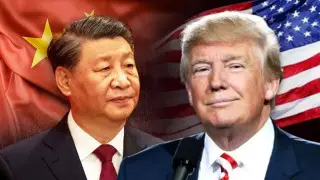
Donald Trump (X/MarioNawfal)
With Donald Trump set to become the next US president after the recently closely contested president polls, India and other Asian countries are expected to benefit due to rising US-China tensions and potential investment restrictions in strategic sectors, as per Moody's Ratings.
"In the Asia-Pacific region, trade and investment flows might be further diverted away from China as the US tightens investments in strategic sectors, which would negatively affect China's economy and consequently dampen regional growth. However, this shift might benefit India and ASEAN countries," the global rating agency said. The global agency anticipated a significantly shift under the Trump administration across fiscal, trade, climate, and immigration issues, departing from the approach of the administration of the current US President Joe Biden.
The rating agency added that Trump could have both legislative and executive avenues to advance his agenda on every front. It further added that as a candidate, Trump promised tax reform, with plans to make the 2017 Tax Cuts and Jobs Act permanent, lower the corporate tax rate, and implement income tax relief. These initiatives, along with targeted and broad tariffs, including steep tariffs on Chinese imports, are expected to increase federal deficits. It highlighted that the US under Trump will adopt a protectionist tarde policy, which would be more disruptive and increase the risks to global growth.
"Protectionist measures could disrupt global supply chains and negatively affect sectors that rely on imported materials and goods, such as manufacturing, technology, and retail," it added.
Trump's trade policy approach would likely bring immediate impacts to the manufacturing sector, the credit rating agency said, adding that although a divided Congress might slow down or adjust the scope of such measures. The climate initiatives of the US are also likely to see reversals as Trump seeks to boost fossil fuel production under the banner of "American energy dominance." Reduced funding for clean energy projects and a possible withdrawal from the Paris Agreement would undermine the US's commitments to reduce greenhouse gas emissions. While federal support for green technologies may wane, private-sector initiatives and state-level mandates, particularly in renewable energy, are expected to partially offset this shift.
Some industry experts believe market-driven growth in wind and solar could continue, as these energy sources have become cost-competitive in many parts of the country. "The shift would likely result in renewed support for the fossil fuel industry, reduced funding for clean energy and green technologies, and loosened environmental regulations, including the Environmental Protection Agency's efforts to reduce emissions in the power and auto sectors. It is likely that the Trump administration will withdraw from the Paris Agreement again and reverse commitments to meeting net-zero greenhouse gas emissions by 2050," the agency said.
On the regulatory front, Trump is expected to pursue a lighter approach, as per the Moody's, which will include relaxed rules for small and midsized banks, potentially reducing their capital requirements but also exposing creditors to higher risks.
(Except for the headline, nothing has been changed by Top Indian News in the wire.)













Copyright © 2025 Top Indian News
